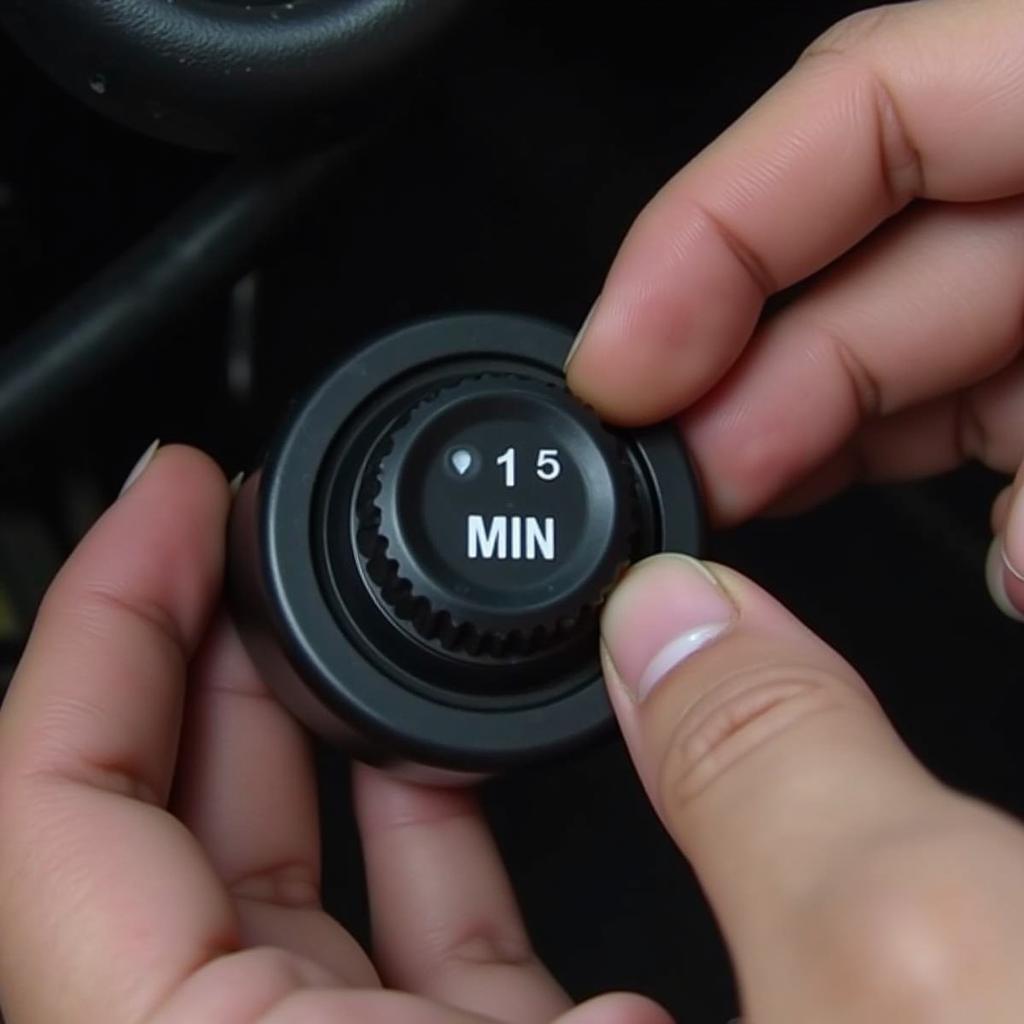The brake warning light on your 2002 Mini Cooper is a crucial safety feature, illuminating on the dashboard to signal potential issues within your braking system. Ignoring this warning light can lead to unsafe driving conditions and potentially dangerous situations. This comprehensive guide will delve into the common causes of a 2002 Mini Cooper brake warning light, provide potential solutions, and offer expert advice to help you get back on the road safely.
Understanding Your Brake Warning Light
The brake warning light, often symbolized by an exclamation mark within a circle or the word “BRAKE,” can indicate several issues. While a faulty sensor or wiring problem might be the culprit, it’s essential to consider more serious possibilities, such as:
- Low Brake Fluid: This is the most common reason for the brake warning light to illuminate.
- Worn Brake Pads: Brake pads have wear indicators that make a noise when they’re worn down, but they can also trigger the brake warning light.
- Brake System Malfunction: This could involve a problem with the master cylinder, brake lines, or other components.
Diagnosing the Problem
Before rushing to a mechanic, you can perform some basic checks to try and pinpoint the cause of the brake warning light:
- Check Brake Fluid Level: Locate the brake fluid reservoir under the hood, usually a translucent container with a “MIN” and “MAX” marking. Ensure the fluid level is within this range.
- Inspect Brake Pads: Examine the brake pads through the spaces between the wheel spokes. Look for significant wear or if the pad material is close to the metal backing plate.
- Listen for Unusual Noises: While driving, pay attention to any unusual noises coming from the brakes, such as grinding, squealing, or clicking.
 Checking Brake Fluid Level in a 2002 Mini Cooper
Checking Brake Fluid Level in a 2002 Mini Cooper
Common Causes and Solutions for a 2002 Mini Cooper Brake Warning Light
Here are some specific reasons why your 2002 Mini Cooper brake warning light might be on:
1. Low Brake Fluid
Cause: Brake fluid naturally depletes over time as brake pads wear down. A leak in the brake lines or a malfunctioning master cylinder can also lead to low brake fluid.
Solution: If the brake fluid level is low, add the correct type of DOT 3 or DOT 4 brake fluid as recommended in your owner’s manual. If you notice a significant drop in brake fluid level, suspect a leak and consult a mechanic immediately.
2. Worn Brake Pads
Cause: Brake pads are designed to wear down with use. Once they reach a certain thickness, the wear indicator will contact the rotor, causing the warning light to illuminate.
Solution: If you discover significantly worn brake pads, replace them immediately. It’s best to replace all four brake pads at the same time to ensure even braking performance.
3. Faulty Brake Pad Sensor
Cause: While less common, a malfunctioning brake pad sensor can trigger the warning light even if the brake pads are in good condition.
Solution: A mechanic can test the brake pad sensor to determine if it’s faulty and needs replacement.
4. ABS Issues
Cause: If the Anti-lock Braking System (ABS) encounters a problem, it can trigger the brake warning light. This could be due to a faulty ABS sensor, control module, or wiring issue.
Solution: Diagnosing ABS problems requires specialized equipment. It’s best to take your Mini Cooper to a qualified mechanic or dealership for diagnosis and repair.
5. Brake Light Switch Failure
Cause: The brake light switch, located behind the brake pedal, can fail, causing the brake lights to malfunction and potentially trigger the warning light.
Solution: A faulty brake light switch needs replacement. This is a relatively simple repair that a mechanic can handle.
When to Seek Professional Help
While some brake warning light causes are simple to address, others require professional expertise. If you encounter any of the following, seek immediate assistance from a qualified mechanic:
- You’re uncomfortable performing the basic checks yourself.
- You suspect a brake fluid leak.
- The brake warning light remains illuminated even after adding brake fluid or replacing brake pads.
- Your brake pedal feels soft or spongy.
- You experience unusual noises or vibrations while braking.
“Ignoring a brake warning light can lead to more extensive damage and costly repairs down the line,” says John Smith, a senior automotive technician with over 20 years of experience. “Regular maintenance and timely attention to warning signs are crucial for maintaining a safe and reliable vehicle.”
Conclusion
Addressing a brake warning light promptly is paramount to ensuring your safety and the optimal performance of your 2002 Mini Cooper. While some causes might be simple fixes, others require professional intervention. Remember, timely maintenance and expert advice are crucial for a safe and enjoyable driving experience.
2002 cooper brake warning light wont go off
FAQs
1. Can I drive my 2002 Mini Cooper with the brake warning light on?
It’s highly discouraged to drive with the brake warning light illuminated. It signifies a potential issue with your braking system, putting you and others at risk.
2. How often should I check my brake fluid?
It’s good practice to check your brake fluid level at least once a month and top it off if necessary.
3. How much does it cost to replace brake pads on a 2002 Mini Cooper?
The cost of brake pad replacement varies depending on factors like location and the chosen mechanic. On average, expect to pay between $150 and $300 per axle.
4. How long can I drive with worn brake pads?
Driving with worn brake pads is unsafe and significantly reduces your stopping distance. Replace them immediately if you suspect they’re nearing the end of their lifespan.
5. How can I prevent future brake warning light issues?
Regularly scheduled maintenance, including brake inspections and fluid flushes, can help prevent many brake-related issues, including warning light triggers.

